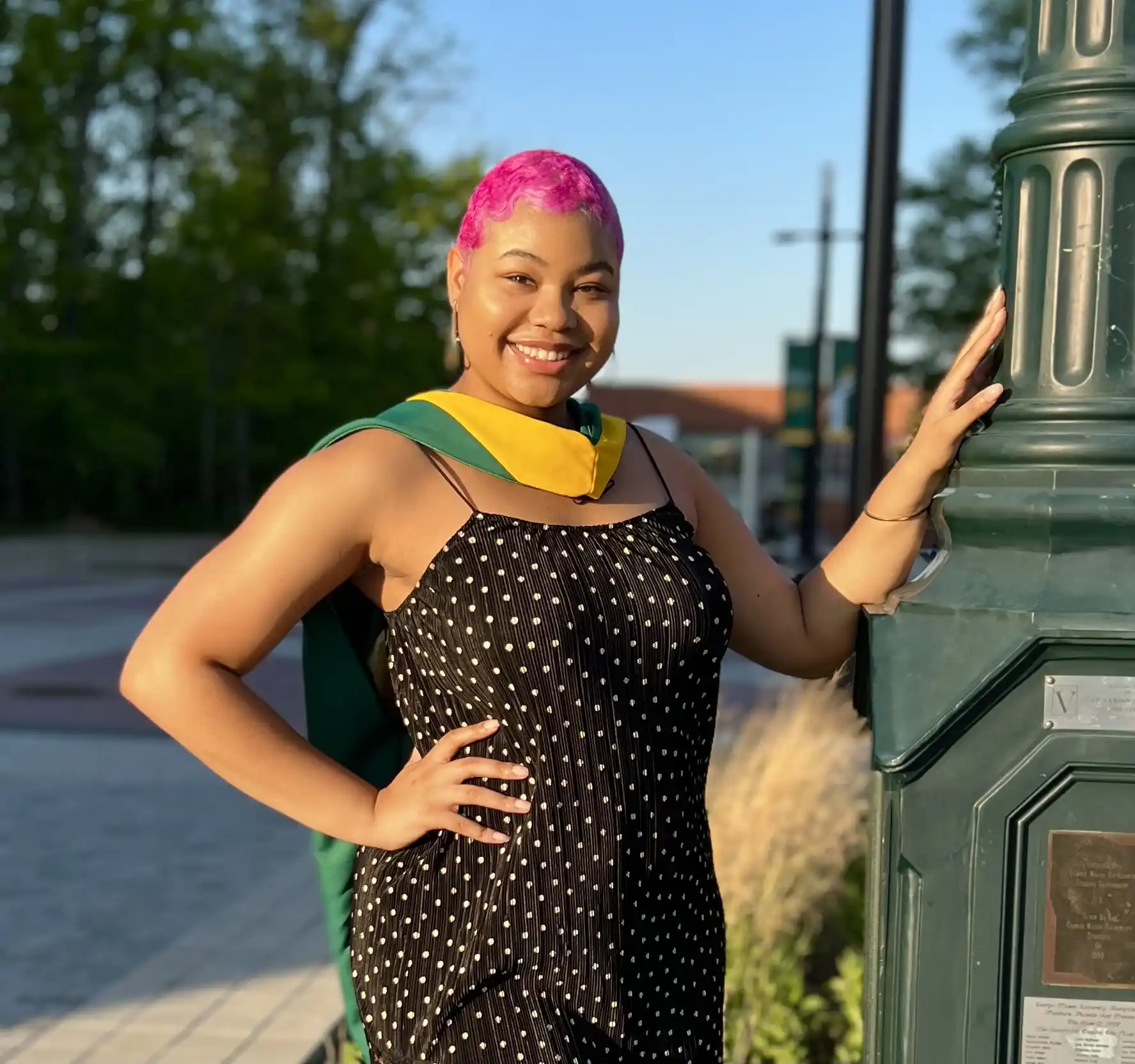Forensics researcher breeds mosquitos to study essential oil-based larvicides
Meet Elle Winfield
Curiosity is at the core of Elle Winfield’s decision to go into science, technology, engineering and mathematics (STEM), and is something she keeps with her throughout her day-to-day life. It was an easy choice to earn her bachelor’s degree in biology from Hampton University and her master’s in forensic science from George Mason University. Her education in biology and forensics has inspired her to ask challenging questions about topics which influence the environment around her.

Elle Winfield knew she wanted to apply her skills and learn even more about the world of science, technology, engineering and mathematics (STEM) after earning her master’s degree. As a fellow, she is learning to rear mosquitos and sandflies for the Department of Defense (DoD). (Photo Credit: Eden Winfield)
For example, why are flies and beetles more attracted to certain parts of a postmortem body than others, and how do insects colonizing remains contribute to forensic investigations? Additionally, while volunteering as a research assistant under entomologist Dr. Shawn T. Dash, Winfield was encouraged to study how insects play a part in forensics. She took these big questions and Dash’s encouragement into her fellowship with the Department of Defense (DoD).
After graduating, Winfield wanted to close the gap between academia and real-life application. So, she accepted an appointment to the DoD’s Walter Reed Army Institute of Research (WRAIR) as a fellow in the Entomology Branch’s Vector Borne Diseases team under the mentorship of LTC Elizabeth Wanja.
WRAIR conducts biomedical research to discover, design develop and deliver globally impactful solutions for military relevant infectious diseases, brain health and performance optimization through innovative research. This innovative research is critical for protecting and optimizing the lives and well-being of service members and maintaining the fighting force, especially during contingency operations and deployments, particularly in the endemic areas of infectious disease. By integrating basic research and advanced development of products to meet U.S. Army and DoD requirements, WRAIR strives to be the premier DoD biomedical research organization.
While Winfield contributes to many research projects, her main study focuses on a common insect disease vector, the mosquito. Mosquitos play an important role in ecosystems as pollinators and food sources for other animals. However, many species of mosquitoes transmit deadly diseases both to humans and animals, making them an important research topic. Winfield is collaborating with Dr. Ivy Hurwitz of the University of New Mexico Center for Global Health, on the study of a novel mosquito control approach using environmentally eco-friendly larvicides – a type of pesticide designed to kill insect larvae without negatively impacting the environment.
Currently, the main method of mosquito control is chemical pesticides, which have noticeable downsides. Chemicals may effectively control mosquitos for a period, but due to how fast mosquitos breed and adapt, they quickly develop resistance to these chemicals. Additionally, pesticides can harm non-target organisms including humans, wild and domestic animals and other beneficial insect species important for our environment.
“My responsibility as a partner in this project entailed rearing mosquito larvae to be used in killing bioassays under laboratory conditions,” said Winfield. “The task of rearing the larvae is a delicate one because they must be the optimal size to guarantee ingestion of the larvicide. This task involved much troubleshooting.”
Winfield is studying essential oil-based larvicides as an alternative to synthetic chemical pesticides. Oils do not harm the ecosystem in the same way many pesticides do. This makes them an intriguing answer to the question of how to disrupt the disease-spreading mosquitos without disrupting their surroundings. Winfield hopes this new method of pest control will positively impact communities where mosquitos and the diseases they transmit are endemic. This is important not only for US military applications but for public health in the US and in other areas of the world.
As a fellow, Elle is learning about insect husbandry. She rears and breeds not only mosquitos but also sandflies in an insectary. Produced insects are used by the WRAIR teams, external collaborators in the US and global collaborators to test vaccines and drugs, diagnostic assays and personal protective equipment like treated military uniforms, bed nets and tents. Rearing insects, especially mosquitos for research and experimentation, is an emerging field of STEM and Winfield is excited to be growing into this science ‘niche’ thanks to her ORISE fellowship.
“I think that most people would be surprised to know that the training required to handle infectious diseases and rear insects is quite involved,” explained Winfield. “I spent the first few months of my appointment learning how to handle laboratory animals, feed the female mosquitos using mice or blood through artificial feeding membrane and dissecting mosquitos under a microscope. Also, I have learned to manually infect Aedes mosquitos with dengue virus using a nano-injection technique.”
Winfield thanks her mentors and co-mentors who have been highly invested in her growth as a scientist. Her favorite part of the program so far has been the opportunity to travel to the University of New Mexico to learn the larvicide killing assay approach, and she is excited to share the preliminary results in research conferences. She recommends the WRAIR program to others and says that the experience has bridged the gap between university and experiential learning.
After her fellowship, Winfield plans to return to school to achieve her doctoral degree in entomology with future plans to contribute to the body of knowledge in forensic entomology. She credits her fellowship for inspiring her interest as a research scientist and for cementing her desire for a lifetime of learning.
The WRAIR Research Participation Program is supported by the Oak Ridge Institute for Science and Education (ORISE) managed for the U.S. Department of Energy (DOE) by Oak Ridge Associated Universities (ORAU). ORISE administers educational appointments for students, faculty, teachers, and postgraduates at DOE-approved host facilities and sponsoring agencies under programmatic guidelines and approved funding.

